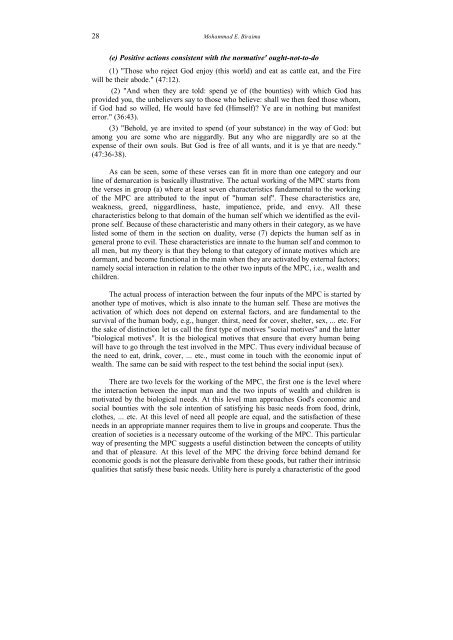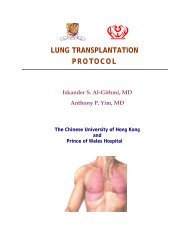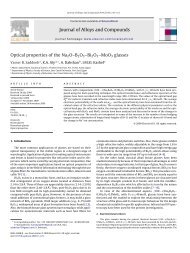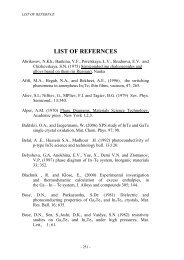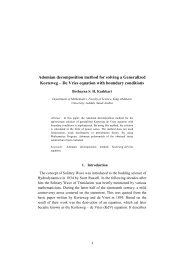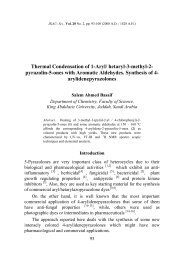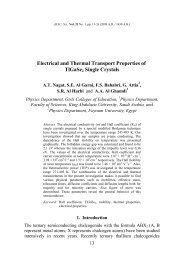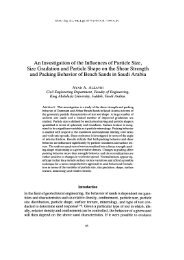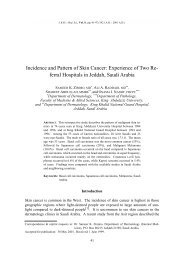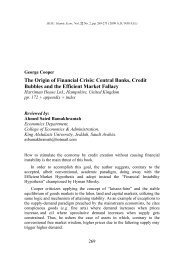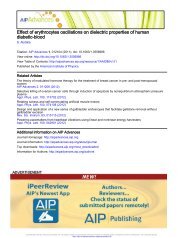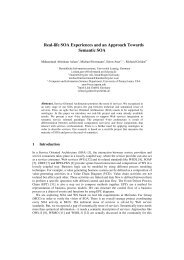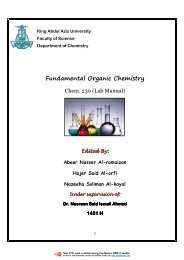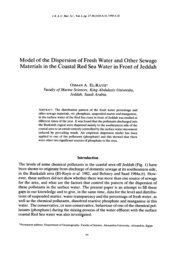A Qur'anic Model for a Universal Economic Theory
A Qur'anic Model for a Universal Economic Theory
A Qur'anic Model for a Universal Economic Theory
You also want an ePaper? Increase the reach of your titles
YUMPU automatically turns print PDFs into web optimized ePapers that Google loves.
28 Mohammad E. Biraima<br />
(e) Positive actions consistent with the normative' ought-not-to-do<br />
(1) "Those who reject God enjoy (this world) and eat as cattle eat, and the Fire<br />
will be their abode." (47:12).<br />
(2) "And when they are told: spend ye of (the bounties) with which God has<br />
provided you, the unbelievers say to those who believe: shall we then feed those whom,<br />
if God had so willed, He would have fed (Himself)? Ye are in nothing but manifest<br />
error." (36:43).<br />
(3) "Behold, ye are invited to spend (of your substance) in the way of God: but<br />
among you are some who are niggardly. But any who are niggardly are so at the<br />
expense of their own souls. But God is free of all wants, and it is ye that are needy."<br />
(47:36-38).<br />
As can be seen, some of these verses can fit in more than one category and our<br />
line of demarcation is basically illustrative. The actual working of the MPC starts from<br />
the verses in group (a) where at least seven characteristics fundamental to the working<br />
of the MPC are attributed to the input of "human self". These characteristics are,<br />
weakness, greed, niggardliness, haste, impatience, pride, and envy. All these<br />
characteristics belong to that domain of the human self which we identified as the evilprone<br />
self. Because of these characteristic and many others in their category, as we have<br />
listed some of them in the section on duality, verse (7) depicts the human self as in<br />
general prone to evil. These characteristics are innate to the human self and common to<br />
all men, but my theory is that they belong to that category of innate motives which are<br />
dormant, and become functional in the main when they are activated by external factors;<br />
namely social interaction in relation to the other two inputs of the MPC, i.e., wealth and<br />
children.<br />
The actual process of interaction between the four inputs of the MPC is started by<br />
another type of motives, which is also innate to the human self. These are motives the<br />
activation of which does not depend on external factors, and are fundamental to the<br />
survival of the human body, e.g., hunger. thirst, need <strong>for</strong> cover, shelter, sex, ... etc. For<br />
the sake of distinction let us call the first type of motives "social motives" and the latter<br />
"biological motives". It is the biological motives that ensure that every human being<br />
will have to go through the test involved in the MPC. Thus every individual because of<br />
the need to eat, drink, cover, ... etc., must come in touch with the economic input of<br />
wealth. The same can be said with respect to the test behind the social input (sex).<br />
There are two levels <strong>for</strong> the working of the MPC, the first one is the level where<br />
the interaction between the input man and the two inputs of wealth and children is<br />
motivated by the biological needs. At this level man approaches God's economic and<br />
social bounties with the sole intention of satisfying his basic needs from food, drink,<br />
clothes, ... etc. At this level of need all people are equal, and the satisfaction of these<br />
needs in an appropriate manner requires them to live in groups and cooperate. Thus the<br />
creation of societies is a necessary outcome of the working of the MPC. This particular<br />
way of presenting the MPC suggests a useful distinction between the concepts of utility<br />
and that of pleasure. At this level of the MPC the driving <strong>for</strong>ce behind demand <strong>for</strong><br />
economic goods is not the pleasure derivable from these goods, but rather their intrinsic<br />
qualities that satisfy these basic needs. Utility here is purely a characteristic of the good


